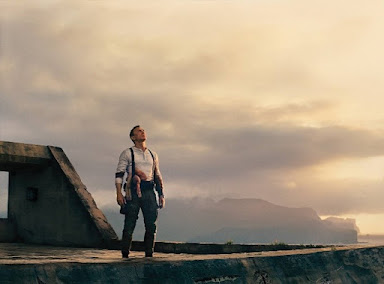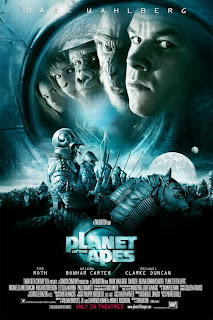Kill your Darlings? Gravitas vs Escapism
It seems like, again, I’ve neglected my writing for longer than expected. It’s been a year since I’ve had my eye on a very specific theme, but I’ll flex my muscles with this idea first (as it’s fresher in my mind). So hopefully I’ll be sharing that other one too very soon.
In the meantime, I hate sounding like an old man, but here I’ll
make an exception because it’s essential to make today’s movie-related point,
kids.
Years ago, depending on what kind of movie you went to see,
you basically knew some things that were sure to happen when choosing a typical
action/adventure movie: the evil guys would do their evil deeds, things would
get dire and in the end the heroes would somehow survive and save the day. Pure
escapism fun. There are many literary theories around that idea that go back to
the earliest fairy tales, comparing these with comfort food. You go back to familiar territory to feel happier and emotionally reinvigorated.
I remember going in to see Indiana Jones and the Temple of Doom back in 1984 with just a vague idea of what the story was about so, when we got to the scene where Indy is standing in the middle of the rope bridge with Thugees on both sides and the evil Mola Ram has captured Willie Scott and Short Round… I was so invested in the story and experiencing it so intensely with our heroes that I was truly worried about having no idea how the hell they were going to get out of that situation.
As unexpected as it was, the resolution was super creative,
over the top and fun, with a little bit of deux ex machina with the cavalry
literally coming to the rescue at the last second (but not before our heroes
had basically gotten mostly out of the situation by themselves). Our heroes
prevailed and lived to fight another day.
Fast forward a few decades and suddenly we find ourselves caught
in a trend where, for some reason, filmmakers have decided to bring back old
heroes and give them a not-so-ceremonious farewell, with very mixed results.

We can argue about creative decisions in artistic terms, but the debatable success of these films suggests that a lot of fans were not happy about them. When they were first released, fans went in to have fun, to celebrate the return of their heroes and their beloved franchise, but it felt like walking out of a funeral instead of a celebration when leaving the theater afterwards.
My oldest son was born in 2002 and as he grew up, I had the
joy of sharing the fun of watching the old James Bond and Indiana Jones movies with him.
I re-watched a lot of these reliving the excitement through his young eyes,
while he showed me a new way of having fun with them with the cool new Xbox videogames
based on these characters. I guess you can imagine where I’m going with this.
Cut to years later, barely coming out of the pandemic
lockdown, when we both went excitedly to the theater to watch the latest James
Bond movie, No Time to Die, hoping to get our spirits lifted by the fun
escapism that these films are known for. Comfort food, remember?
And yes, we got to see an undoubtedly GREAT James Bond film,
a fitting end to Daniel Craig’s version of the character… but hell, it just
didn’t feel right going out of a James Bond extravaganza feeling like, again,
walking out of a funeral.
 The latest experience
I had was just last week while watching Indiana Jones and the Dial of Destiny. I get they wanted to give the character a proper send off while
taking advantage that Harrison Ford was still around and willing to do it. But
why not do it in an exciting, fun, swashbuckling way? Harrison Ford
is great as the grumpy old hero, but why place him in a miserable situation to
begin with? Why unceremoniously kill off screen one of the main characters from
the previous film (Shia LaBeouf’s Mutt), completely throwing out the window the
relevance of the previous adventure (like what they did in Alien 3 by
killing off Newt, Hicks and Ash)? Why suck away John Rhys-Davies’ Sallah’s
bigger-than-life spirit by making him a poor sad old immigrant instead of the over-the-top
Egyptian digger we knew and loved? Was it necessary to have new characters like
Antonio Banderas’ charismatic Captain Renaldo come in and get killed off
in cold blood? (Captain Katanga
from Raiders of the Lost Ark got a much better treatment).
The latest experience
I had was just last week while watching Indiana Jones and the Dial of Destiny. I get they wanted to give the character a proper send off while
taking advantage that Harrison Ford was still around and willing to do it. But
why not do it in an exciting, fun, swashbuckling way? Harrison Ford
is great as the grumpy old hero, but why place him in a miserable situation to
begin with? Why unceremoniously kill off screen one of the main characters from
the previous film (Shia LaBeouf’s Mutt), completely throwing out the window the
relevance of the previous adventure (like what they did in Alien 3 by
killing off Newt, Hicks and Ash)? Why suck away John Rhys-Davies’ Sallah’s
bigger-than-life spirit by making him a poor sad old immigrant instead of the over-the-top
Egyptian digger we knew and loved? Was it necessary to have new characters like
Antonio Banderas’ charismatic Captain Renaldo come in and get killed off
in cold blood? (Captain Katanga
from Raiders of the Lost Ark got a much better treatment).
Setting aside if we agree or not with the creative choice of
that final, crazy stretch of the adventure (if you thought aliens were over the
top, this one takes the cake), the ending feels so very rushed and tagged on. Indiana
Jones’ fate is decided for him with a convenient black out that suddenly ties
up all loose ends in the most unsatisfactory way. The final lonely shot of Indy’s
hand retrieving his hat from a clothesline on a New York City fire escape steel
balcony is a far call from the epic ending from Indiana Jones and the LastCrusade, where our heroes rode off into the sunset after having overcome evil
forces and reached ultimate enlightenment. Again, the feeling we got when the
lights came up in the theater was not a rush of joy and excitement, but a sad
nostalgic sense of loss.

So, what’s my point? That maybe filmmakers have gone back to
the well too many times and, trying to cater to older fans, they have instead pissed
them off by choosing gravitas over escapism (hence the title of this post, see
how everything comes together?).
Artistic and narrative choices have been made by people who
were not the original creators of the characters and who might have missed a
bit of their essence. Sometimes this works well: Tony Stark’s sacrifice in
Avengers: Endgame was perfectly built up and satisfying; we all still feel chills when thinking about that simple but powerful line expertly delivered by the great Robert Downey Jr: "I am Iron Man"... a great, memorable character
send-off that everyone will remember (and the box office numbers show it).

Tom Cruise has also done an amazing job catering to the
audience with films such as Top Gun Maverick (where he could have easily killed
off his title character) and the Mission: Impossible franchise. Yes, the stakes
are high and sometimes favorite characters get killed, but in the end the
feeling is of excitement and victory. Escapism. Comfort food. And not in any
way less relevant.
Does this mean they shouldn’t take risks? Of course not.
There are some amazing noir films, fantastic bleak endings, and deeper themed
films out there (Planet of the Apes, Blade Runner 2049 and Drive
come to mind, just to name a few). But when these decisions go against the very
essence of the characters they are using without a good reason, they tend to
backfire.
To be honest, they shouldn’t try to always force gravitas to subvert expectations on adventure/fantasy films. Sometimes you just go in for the popcorn. We love our popcorn.








Comments
Post a Comment